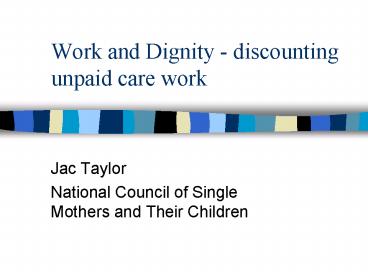Work and Dignity discounting unpaid care work
1 / 7
Title:
Work and Dignity discounting unpaid care work
Description:
Unpaid care work is not economically productive and therefore is not recognised ... deficit model underpinned by economic behaviourism', granting power to the State ... – PowerPoint PPT presentation
Number of Views:495
Avg rating:3.0/5.0
Title: Work and Dignity discounting unpaid care work
1
Work and Dignity - discounting unpaid care work
- Jac Taylor
- National Council of Single Mothers and Their
Children
2
- Unpaid care work is not economically productive
and therefore is not recognised as a legitimate
job - Childrens loss of care and parental time is not
recognised as economically significant and so
does not count - Thus contemporary society is oblivious of the
consequences of reducing and preventing unpaid
care provision in families - Instead of social recognition and support for
valuable and necessary work of child rearing and
nurturing, single parents face increased poverty,
coercion, stigma and punishment
3
- The dominant discourse portrays a story of the
lazy single mum who has forgotten how to work
and the story of the virtuous taxpayer who
graciously doles out dollars to indigent
dependents - This becomes the marketing slogan to convince the
population that punitive measures against poor
families are both necessary and justified.
4
- Current system is based on a deficit model
underpinned by economic behaviourism, granting
power to the State to control and punish
vulnerable families - Single parents are forced into low paid, insecure
paid work with practically no financial return,
and forced to place their children into
childcare, or suffer the consequences of a
punitive compliance regime - US research shows increased levels of stress and
paid and unpaid care work but negligible changes
in income support status
5
- The cuts to payment levels, forced paid work
activity, increased claw back on earnings and
exposure to loss of payment creates a new
atmosphere of coercion, stress and punishment for
families often already dealing with multiple
crises and disadvantage. - This changes will result in compounding costs to
families, most of which will not be readily
visible - The social fall-out of stressing vulnerable
families will be distributed to crisis services
at even greater cost
6
- What we need
- A system that recognises that paid workforce
withdrawal and re-entry are normal, common events
over the life course and that unpaid care work
provides society with a net benefit - It would recognise and value not only the
significant social contribution of unpaid care
work but that this comes at a personal cost of
loss of income, skills erosion and opportunity
costs, warranting recompense - It would provide structured and supported
pathways for unpaid carers to re-skill, including
access to funding for training / education and
ancillary costs
7
- It would provide financial and social support to
unpaid carers and their families while not in the
labour market, without stigma, blame and
punishment - It would acknowledge childrens need for parental
care and time - It would acknowledge sole parents are in the best
position to determine their familys needs - It would be a system based on respecting the
fundamental dignity of every human being living
in our society































